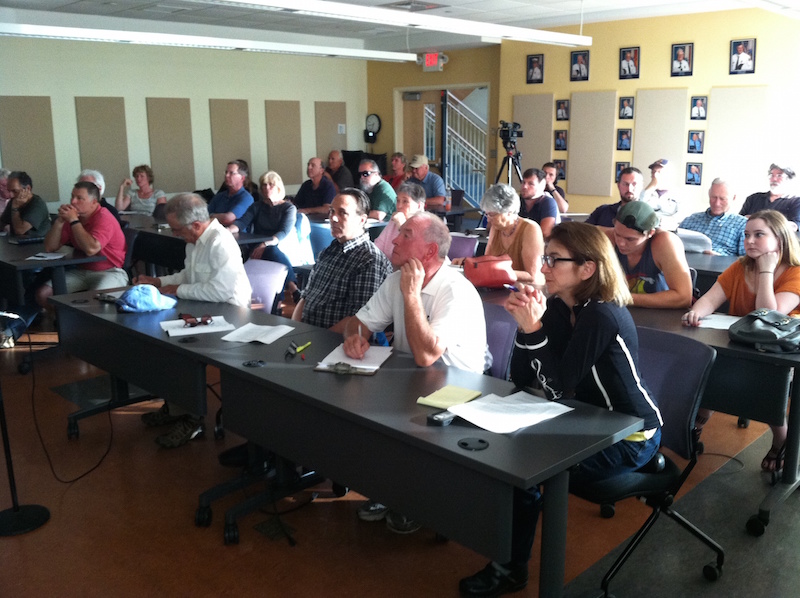Tisbury residents took their board of health to task during the first of three public hearings on a set of proposed regulations aimed at protecting the town’s coastal ponds from the effects of future development.
About 30 people, including a number of town officials, attended the hearing at the town emergency services building Thursday evening. Board of health chairman Michael Loberg, who unveiled the draft so-called no-new nitrogen rules in May, called them an important first step in protecting Lake Tashmoo and the Lagoon Pond, both impaired estuaries.
Under the proposed rules, a new three-bedroom house with a conventional Title 5 septic system would pay on average a $3,200 annual fee. The fee would be reduced to $2,100 with a denitrifying septic system. A denitrifying toilet would generate an even lower fee, around $320. Mr. Loberg said the aim is partly to encourage people to adopt the most effective technology.
Public awareness surrounding the health of Island ponds has grown in recent years, due largely to the work of the Massachusetts Estuaries Project, which has provided nitrogen reduction goals for most of the coastal saltwater ponds in the state. More than two thirds of the controllable nitrogen in Lake Tashmoo and the Lagoon comes from septic systems, and the rest from fertilizer, runoff and other sources, according to the MEP.
Mr. Loberg said the new rules would help protect public health and water quality while allowing residential development to continue in the watersheds. He added that public discussion and increased awareness are also key goals of the proposal.
The rules would apply to all new development in the watersheds, including any changes of use that result in increased wastewater flow. Property owners would pay a semiannual fee based on water usage, but the fee would be reduced if they install nitrogen-mitigating technologies such as advanced septic systems and composting toilets.
The fees would be used to support other nitrogen-reducing efforts in the watersheds (subject to town meeting approval) and could provide rebates for people who connect to the town sewer or install a denitrifying system.

“We’re here because over five years or so we haven’t done much to fix the problem,” Mr. Loberg said at the hearing, although he drew attention to the Islandwide fertilizer regulations — also aimed at reducing the amount of nitrogen in Island ponds — that went into effect last year with only one dissenting vote.
Many who attended the hearing agreed the town should act, but chafed at the idea of a fee that did not apply equally to everyone with an effect on the watersheds.
“People who don’t even live here use the ponds,” said Doug Dowling, who asked for harder numbers on the sources of nitrogen entering the two watersheds. “Why are all the current polluters not getting in on paying for this?” he said.
Chris Priore worried that the new rules would make it harder for people to build new homes, and argued that existing property owners should share the burden. He also advocated for removing the nitrogen already in the ponds. The question of fairness simmered throughout the hearing, although town officials tried to explain that the proposal was just one part of the solution.
Mr. Loberg said limiting the amount of new nitrogen would not address the surplus of about six tons entering the watersheds every year — about a third of the total load. “This is something we are trying to do to keep things from getting worse,” he said of the proposal. “It is not the answer to the big problem.”
Many of the nitrogen mitigation efforts underway on the Island rely on the MEP for baseline data and nitrogen thresholds. But not everyone agrees with the approach. Donald Muckerheide, a fierce critic of the MEP, argued that far more nitrogen on the Island comes from rainfall than from wastewater. “MEP is the largest fraud ever perpetrated on the population of the state of Massachusetts,” he said. Rather than focusing on wastewater, he urged the town to follow the lead of other communities in the country that have installed aeration systems to return microbes and bacteria to their impaired ponds.
But others defended the reports, including Mr. Loberg, who pointed out that the MEP does not consider rainfall to be a controllable source of nitrogen. Tisbury selectman and wastewater commissioner Melinda Loberg added that scientists across the nation have vetted the MEP reports and found them to be equivalent to other accepted models. “This was criticized and taken to the top level of scrutiny by scientists of every ilk,” she said.
Discussion eventually returned to the issue of fairness, with Mr. Priore suggesting that the new rules be applied to seasonal renters as well as residents. “Everyone who flushes a toilet should be responsible,” he said. “It’s the bottom line.”
Chris Murphy, a member of the Chimark conservation commission who attended the meeting, agreed that existing septic systems are the bigger problem, but said he saw the proposal partly as an alternative to declaring a moratorium on new construction in the watersheds. “This seems like a great step forward,” he said.
Two more hearings on the proposed bylaw are planned for June 22 and June 26. Both begin at 6:30 p.m. in the Tisbury Emergency Services Building.




Comments (8)
Comments
Comment policy »